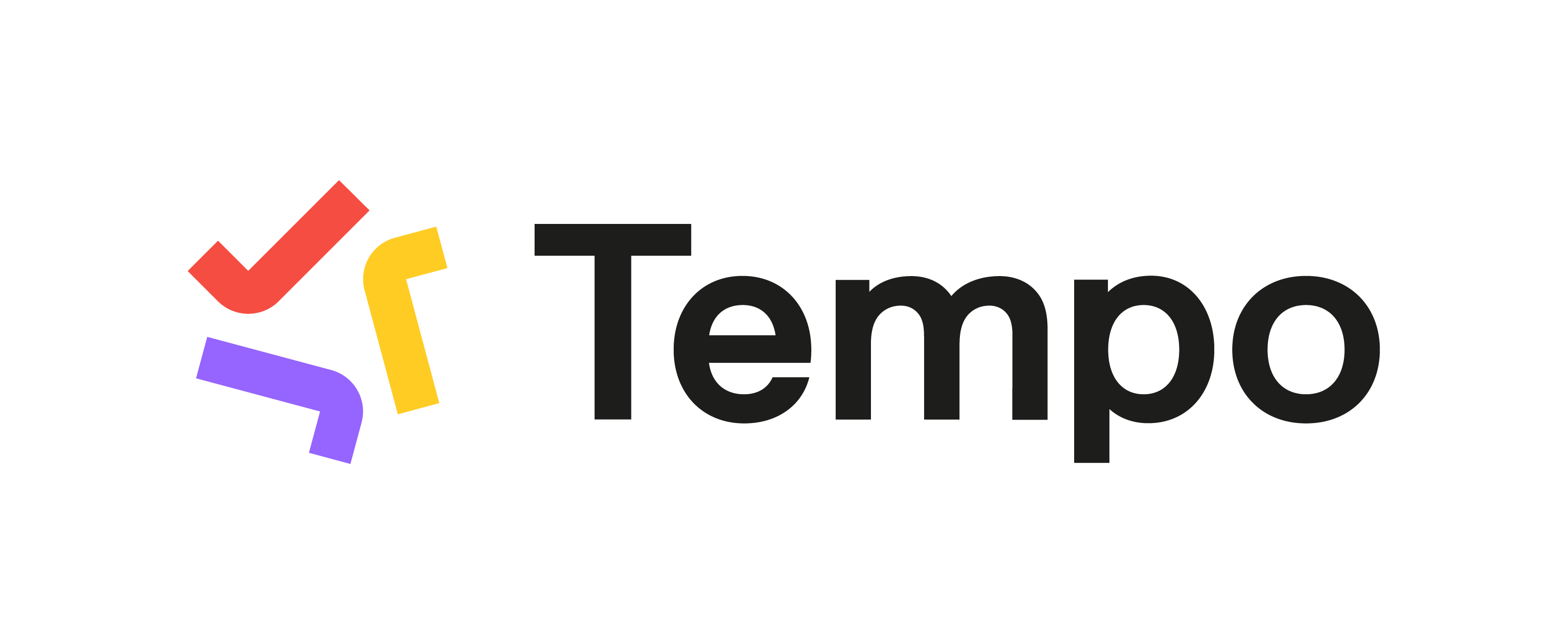In this tutorial, you will learn how to use Tempo accounts to track billable work in order to create an invoice for a customer. As well, you will track non-billable hours for the same customer for other types of work. Using two accounts gives you control over how the work and projects for your customers are organized, and gives you rich data for reports that's easy to filter.
Tracking billable work using Tempo accounts is one of two ways in which you can do this in Tempo Timesheets: the other is to use the Billable hours field (see Tracking Billable Hours on Projects).
-
For more background on these two methods for billing, see Best Practices for Tracking Billable Hours.
-
Want to see this tutorial in action? Watch the videos in this playlist: Tutorial: Tracking Billable Work with Tempo Accounts
The scenario
Catherine Evans is a project manager at Lunar Industries, a company that does helium-3 mining on the moon! She heads up a small team of consultants who are currently doing work for an external customer called Greenergy Inc. The research and consulting work is billable, but there is also some presales work involved, which is not billable.
To keep the different type of work separate, Catherine will create both billable and non-billable Tempo accounts for Greenergy. Then she and the consultants log their time to the appropriate account for the type of work they're doing. Finally, she will run a report on Greenergy's two accounts to see the total amount of time spent working for them, as well as a report on only the billable account. She'll send this second report to her Accounting department who can then use it as the base for an invoice that they'll send to Greenergy.
The setup
Related video: How to Get Set Up before Using Tempo Accounts
Related topics: Adding the Account Field to Jira Issue Screens, Global Permissions, and Creating and Deleting Teams
-
The Tempo Account custom field needs to be added to the Jira Issue screen to be able to log time to Tempo accounts. You need Jira Administrator Permissions to add this field.
-
Catherine needs the Tempo Account Administrator permission to create Tempo accounts, account categories, and customers. Her Jira Administrator Permissions can grant her this Global permission.
-
Three Jira projects have been created to track the consulting and presales work for Greenergy Inc.: Helium-3 Energy, Lunar Geology, and Helium-3 Presales
-
A Tempo team has been created for Catherine's group of consultants.
Step 1: Create a customer
Related video: How to Create Tempo Accounts for Tracking Billable Work
Related topic: Creating Customers for Tempo Accounts
Catherine adds Greenergy Inc. as a Customer in Tempo to be able to link them to all their related Tempo accounts.
-
Select Accounts :accounts_dc: in the Tempo sidebar to open the Accounts main page, and then click the Customers button in the top right.
-
On the Customers page, click + Create Customer in the top right.
-
In the Create Customer form, enter Greenergy as the Name and GR1257 as the Key, which is a unique identifier for this customer and matches what's in Lunar Industries' accounting software.
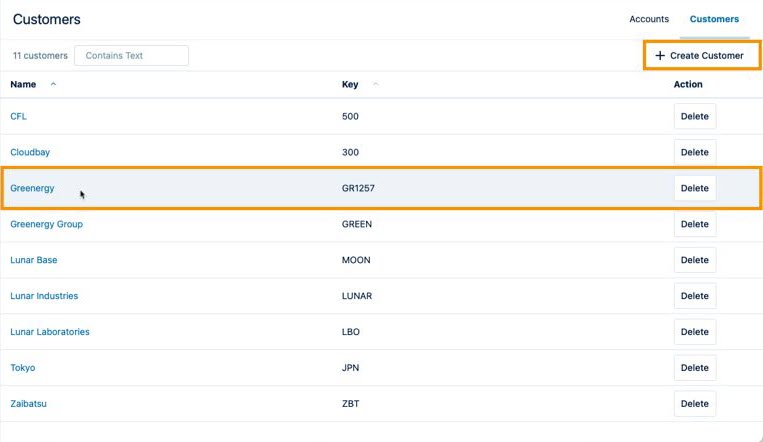
Step 2: Create categories for the Tempo accounts
Related video: How to Create Tempo Accounts for Tracking Billable Work
Related topic: Creating Tempo Account Categories
Before creating the Tempo accounts themselves, Catherine creates two new categories for the customer's billable and non-billable accounts. Categories let you organize and group multiple accounts together in a way that makes sense for your company, such as for Administration, Development, Research, and Internal Training.
Account categories also let you identify accounts to be of a certain Type, and that's really important for filtering when you’re running reports later on. There are four types you can use: Billable, Capitalized, Internal, or Operational.
-
Select Settings in the Tempo sidebar.
-
Under Accounts, select Account Categories.
-
For the billable account category, enter Consulting as the Name; CSLT as the Key (the Key is a unique identifier for this category); and set the Type to Billable. Click Add beside the new category to create it.
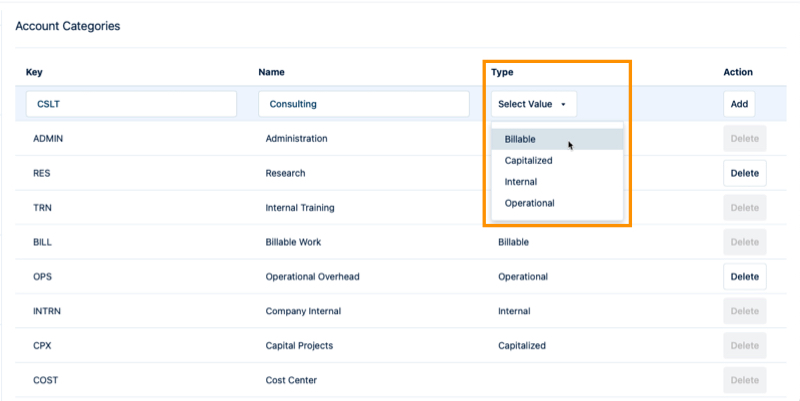
-
For the non-billable account category, enter Presales as the Name, PRSL as the Key, and set the Type to Operational, which can be used for non-billable hours.
Catherine now has account categories for both billable and non-billable work in which she can organize the relevant Tempo accounts that she will create in Step 3 below.
Step 3: Create billable and non-billable Tempo accounts
Related video: How to Create Tempo Accounts for Tracking Billable Work
Related topic: Creating Tempo Accounts
Now Catherine is ready to create two new accounts for tracking work as either billable or non-billable. These are the accounts to which her team will log their time.
-
Select Accounts in the Tempo sidebar.
-
On the Accounts page, click the + Create Account button in the top right. The Create Account form appears.
-
For the billable account:
- Enter H3 Energy Billable as the Name
- Edit the automatically generated Key to be 1357. The account Key must be unique, and you can’t change it after you create the account, so make sure it’s what you want now! In this example, the account's Key matches the related data in the company's accounting system.
- Add yourself as the Account Lead
- Select Greenergy as the Customer
- Select Consulting as the Category, which is a Billable type
- Add a Contact name, who is an employee of Greenergy (external). No email is required for this.
- Link the account to both of its associated Jira Projects: Helium-3 Energy and Lunar Geology
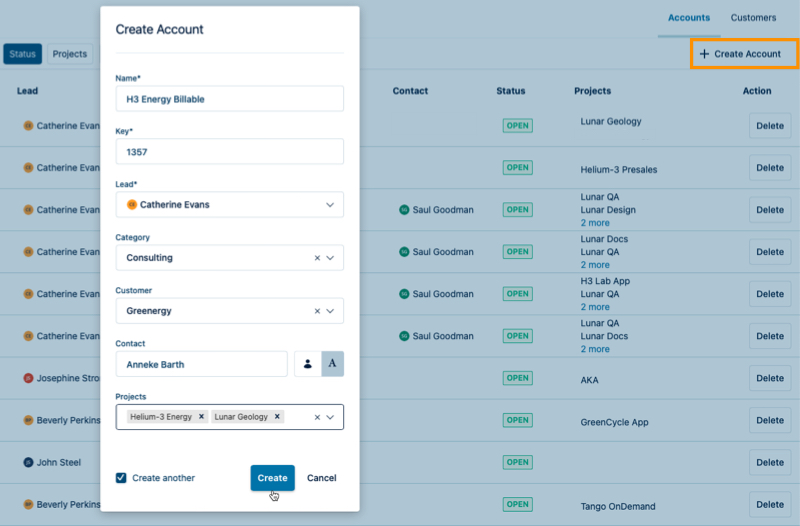
-
Check Create another, then click Create. The Billable account is created and the Create Account form stays open.
-
For the non-billable account:
- Enter H3 Solutions as the Name
- Edit the Key to be 1457, which matches the related data in the company's accounting system.
- Add yourself as the Account Lead
- Select Greenergy as the Customer
- Select Presales as the Category, which is an Operational type
- Add the same Contact as for the billable account.
- Link the account to its associated Jira Projects: Helium-3 Presales. See Step 4 below for other ways to do this.
-
Click Create and the non-billable account is created.
Now Catherine has one account created for billable work and one for non-billable work.
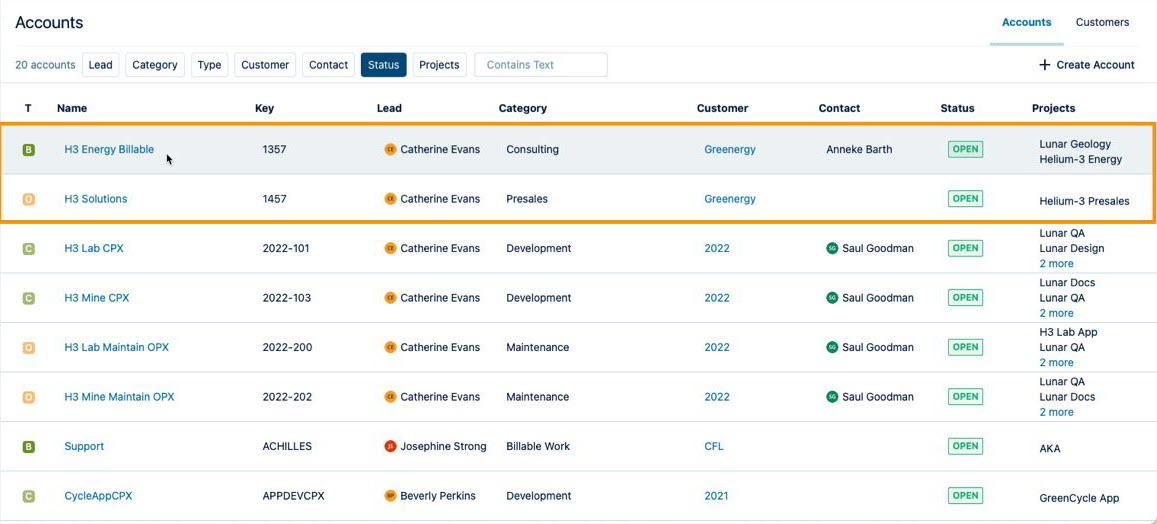
Step 4: Link each Tempo account to its related Jira projects
Related video: How to Log Time to Billable Tempo Accounts
Related topics: Linking Tempo Accounts to Jira Projects and Setting the Default Tempo Account for a Jira Project
Linking Tempo accounts to related Jira projects makes it possible for time to be logged to these accounts in the Jira work items (see Step 5 below). Catherine linked the billable and non-billable accounts to their related Jira projects when she created the account, but here are two other ways to do this afterward:
-
On the main Accounts page, click the account name to which you want to link Jira projects. Then on the account's Overview, click + Add Project Link on the right and select a Jira project from the dropdown.
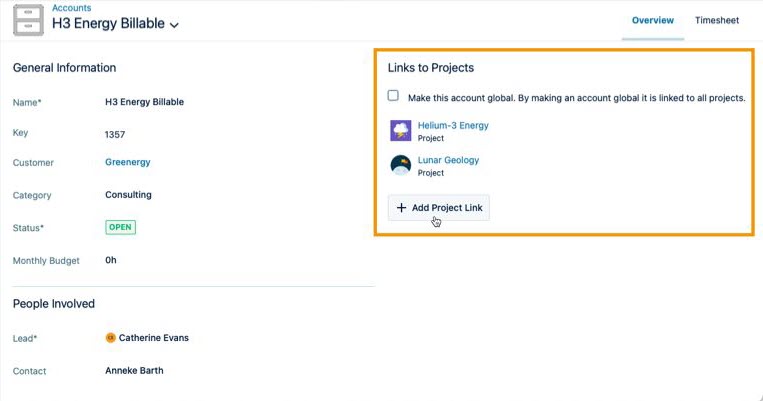
OR
-
From a Jira project, go to the Project Settings and click Apps > Accounts. Then select an Account from the list at the top and click Link +.
You can also click the Set default button beside the account that you want to be automatically selected for all work items created in this Jira project from this point on. Setting a default account isn't mandatory, but it makes things easier for logging time, and there’s less chance of error when multiple accounts are linked to a project.
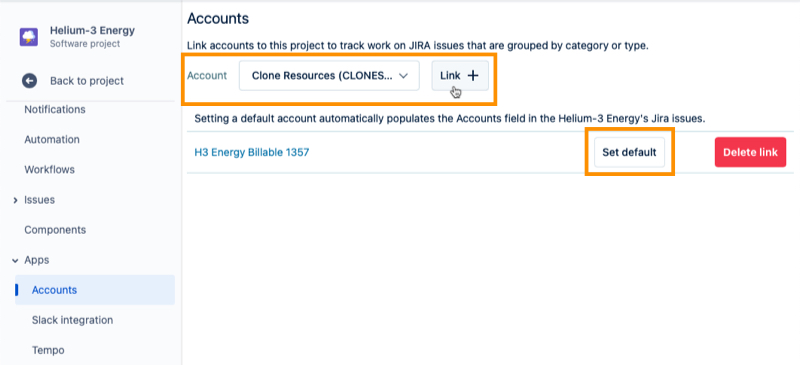
Step 5: Link Tempo accounts to the Jira work items and log time
Related video: How to Log Time to Billable Tempo Accounts
Related topics: Logging Time to Tempo Accounts
Now Catherine needs to link either the billable or non-billable account to the appropriate Jira work items in the Jira project. Then her team can log their time to the correct account selected in the Account dropdown in each work item. This Account dropdown appears because the Jira administrator added it as a custom field to the Jira issue screens - see Adding the Account Field to Jira Issue Screens.
-
Open the Jira project called Helium-3 Energy, which is one of the projects for the billable consulting work for Greenergy.
-
Open a work item in this project.
-
From the Account dropdown in the work item, select the Helium-3 Energy account. Only accounts that have been linked to this Jira project appear in this dropdown.
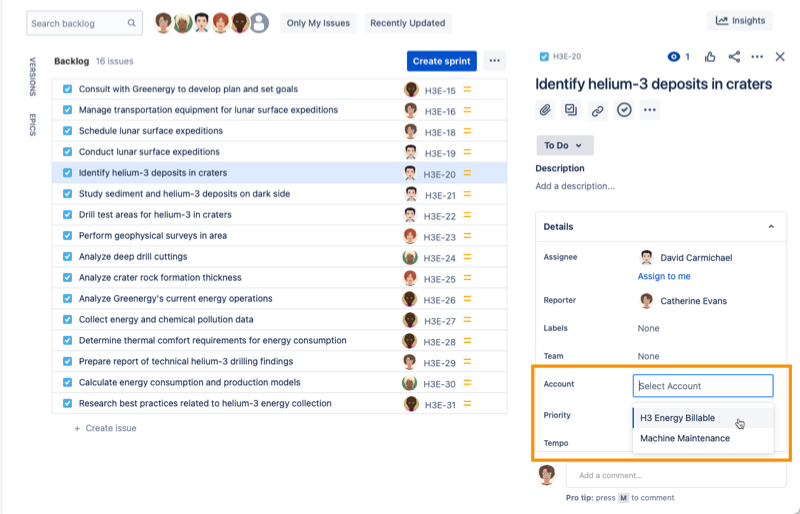
-
Log all consulting work to this work item and the hours will be automatically assigned to this billable account.
-
For pre-sales work, open the H3 Presales Jira project and select as the H3 Solutions account (non-billable) in the Account dropdown in its work items. Then log the hours related to presales to these work items. All hours will then be automatically assigned to that non-billable account
-
As time goes on, Catherine can check how much time is logged to each account in its Timesheet - see Viewing Time Logged to Tempo Accounts for information.
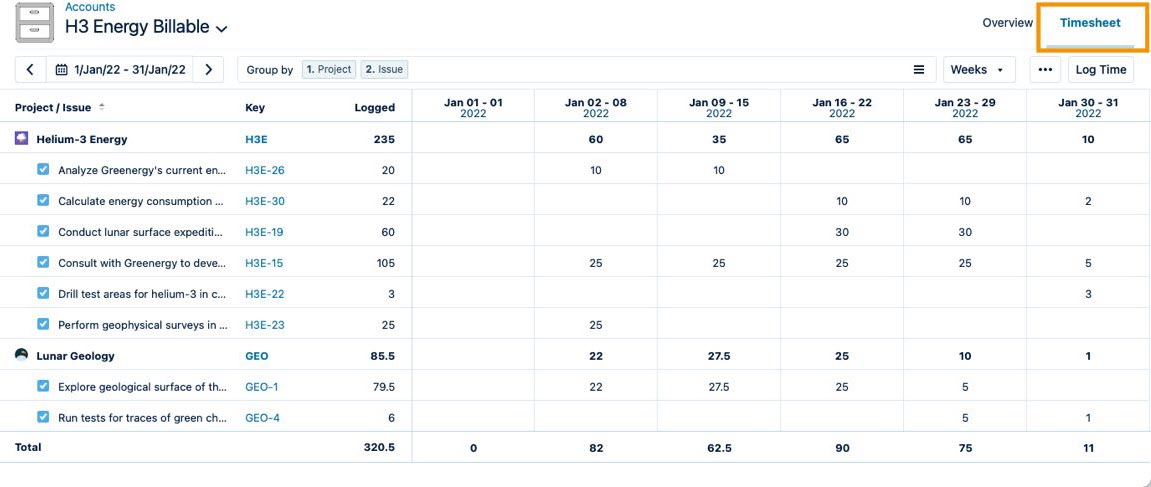
Step 6: Create a report on billable accounts for invoicing
Related video: How to Create a Report on Billable Accounts for Invoicing
Related topics: Creating Reports, Selecting a Reporting Period, Filtering the Data in Reports, Grouping and Sorting Data in Reports, and Exporting Reports
The consulting team has been working for over a month on the contract with Greenergy Inc., and now Catherine can generate a couple of reports that she will export and send to her Accounting department:
-
One for all the work done for the customer, Greenergy Inc., for financial insights.
-
One for only the billable consulting work done for Greenergy Inc. This report will be the base for sending an invoice to the customer.
-
Select Reports in the Tempo sidebar, then click the Logged Time tile.
-
For the first customer account report: In the Create Logged Time Report wizard, select Customer in the Filter by field and check Greenergy in this list.
-
In the Group by field, select Account, Project, and Issue. This way, the time logged to each Jira work item is grouped separately into the two accounts for this customer: billable and non-billable with each project listed beneath it.
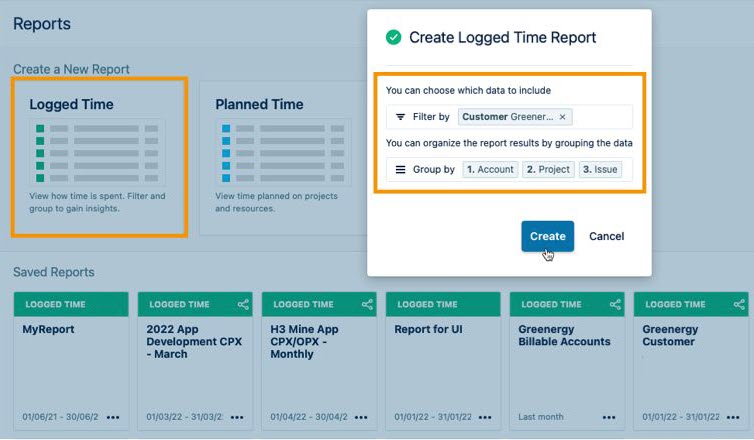
-
Click Create and the customer's accounts report is done.
-
In the date picker in the top left, select Last and then Month to create a report where the data shown is always for the last month relative to the current date (a dynamic-period report). Click Apply.
-
Click Save at the top and give the report a name, such as Greenergy Customer Accounts - Monthly, and click Save Report.
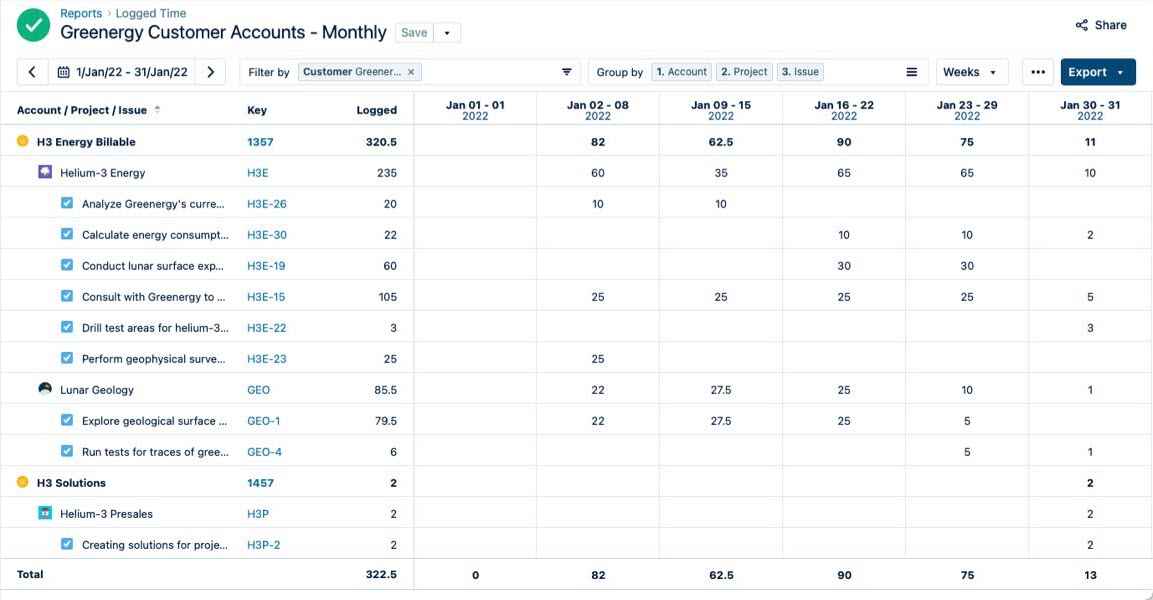
-
Click Export in the top right and select XLS Report Data, which saves the report in the Excel format.
For the second billable-only account report, simply modify this first report:
-
Remove Account from the Group by field, keep Project and Issue, and then add User and Worklog. Click Apply.
By adding User and Worklog, Greenergy knows who is doing the work for them and all the details down to the individual worklog.
-
Click in the Filter by field and then select CATEGORY TYPES and check Billable, so only the billable accounts for Greenergy will be displayed.
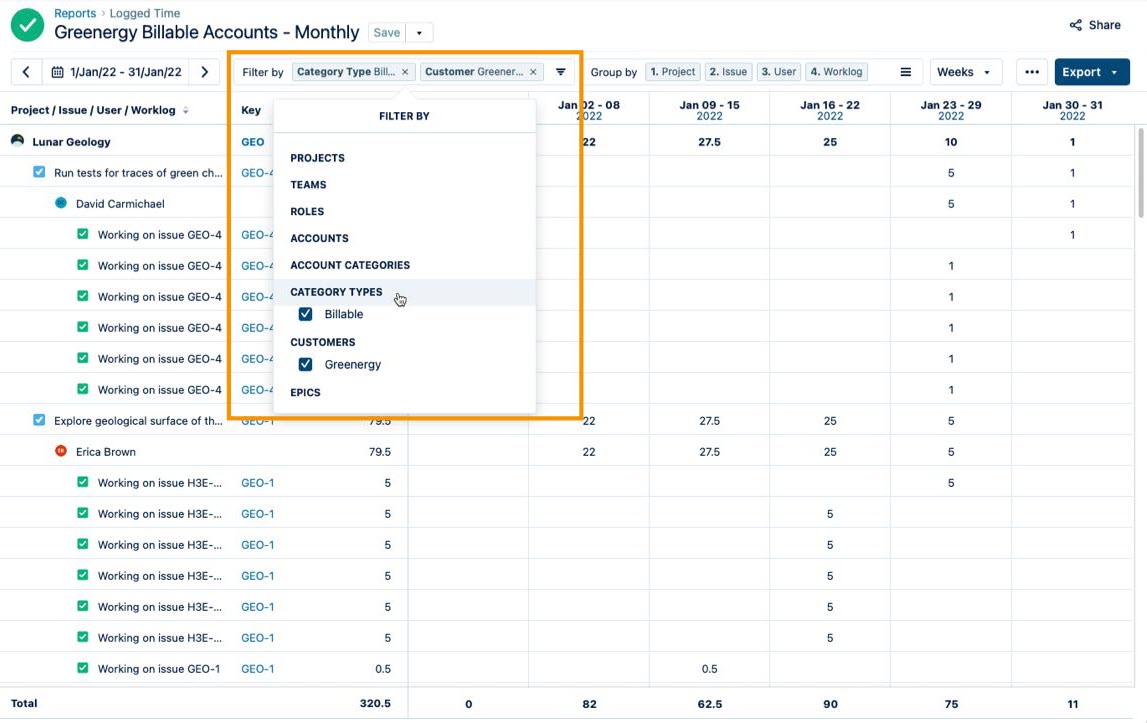
-
Open the Save menu and choose Save as and give the report a name, such as Greenergy Billable Accounts - January 2022.
-
Click Export in the top right and select XLS Report Data, which saves the report in the Excel format.
Catherine will run this billable report each month, save it as a new report with the name for that month, then export it and send it to the Accounting department.
The monthly invoice for the billable consulting work is then sent to Greenergy Inc. by the Accounting team, and Lunar Industries will get paid for their expertise in helium-3 mining.
Catherine can also share a saved report with others in her company - see Sharing Reports for information.
